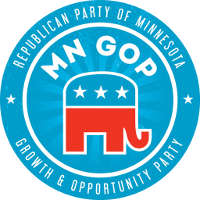
The Republican Party of Minnesota is a conservative political party in the U.S. state of Minnesota. It is affiliated with the United States Republican Party.

The 2008 United States Senate elections were held November 4, 2008, with 35 of the 100 seats in the Senate being contested. Thirty-three seats were up for regular elections; the winners were eligible to serve six-year terms from January 3, 2009 to January 3, 2015, as members of Class 2. There were also two special elections, the winners of those seats would finish the terms that ended January 3, 2013.

The 2008 United States Senate election in Minnesota took place on November 4, 2008. After a legal battle lasting over eight months, the Democratic–Farmer–Labor Party (DFL) candidate, Al Franken, defeated Republican incumbent Norm Coleman in one of the closest elections in the history of the Senate. Franken took his oath of office on July 7, 2009, more than half a year after the end of Coleman's term on January 3, 2009.
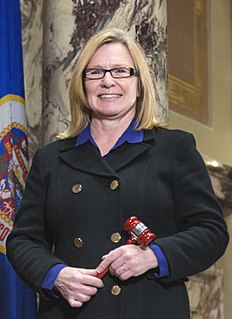
Michelle L. Fischbach is an American politician who served as the 49th lieutenant governor of Minnesota, from 2018 to 2019. She previously served as president of the Minnesota Senate. A Republican, she was first elected to the State Senate in 1996, where she represented portions of Benton County and Stearns County. In January 2018, as President of the Senate, Fischbach became Lieutenant Governor following the resignation of Tina Smith. She was succeeded as Lieutenant Governor by Peggy Flanagan on January 7, 2019.

Elections were held in Minnesota on Tuesday, November 2, 2010. Primary elections took place on August 10, 2010.

Elections were held in Minnesota on November 4, 2008. Primary elections took place on September 9, 2008.

The 2014 United States Senate election in Minnesota was held on November 4, 2014, to elect a member of the United States Senate to represent the State of Minnesota, concurrently with the election of the Governor of Minnesota, as well as other elections to the United States Senate in other states and elections to the United States House of Representatives and various state and local elections.

A general election was held in the U.S. state of Minnesota on November 4, 2014. All of Minnesota's executive officers were up for election as well as all the seats in the Minnesota House of Representatives, several state judicial seats, a United States Senate seat, all of Minnesota's eight seats in the United States House of Representatives, and several seats for local offices. A primary election was held on August 12, 2014, to nominate major political party candidates for partisan offices and candidates for nonpartisan offices.
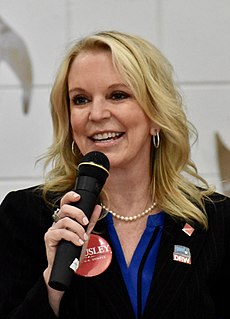
Karin Housley is an American politician, businesswoman, and Republican member of the Minnesota Senate, where she represents the Forest Lake area and the St. Croix River Valley. Housley ran unsuccessfully as the Republican nominee in Minnesota's 2018 special election for United States Senate.
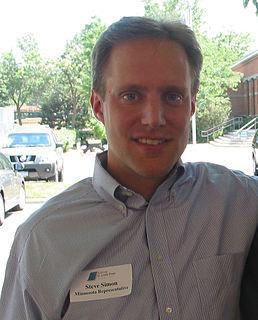
The 2014 Minnesota Secretary of State election was held on November 4, 2014, to elect the Minnesota Secretary of State.

The 2016 Minnesota House of Representatives election was held in the U.S. state of Minnesota on November 8, 2016, to elect members to the House of Representatives of the 90th Minnesota Legislature. A primary election was held in several districts on August 9, 2016. The election coincided with the election of the other house of the Legislature, the Senate.
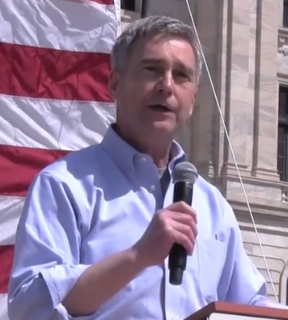
The 2016 Minnesota Senate election was held in the U.S. state of Minnesota on November 8, 2016, to elect members to the Senate of the 90th and 91st Minnesota Legislatures. A primary election was held in several districts on August 9, 2016. The election coincided with the election of the other house of the Legislature, the House of Representatives.
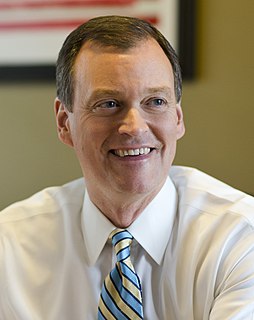
The 2018 Minnesota gubernatorial election took place on November 6, to elect the 41st Governor of Minnesota as incumbent governor Mark Dayton chose not to run for re-election for a third term. The Democratic nominee was congressman Tim Walz from Minnesota's 1st congressional district while the Republicans nominated Hennepin County commissioner Jeff Johnson. The Independence Party of Minnesota didn't field a candidate for the first time since 1994. Going into the election the polls showed Walz ahead and the race was characterized as lean or likely DFL.

A special election was held in the U.S. state of Minnesota on February 12, 2018, to elect a new representative for District 23B in the Minnesota House of Representatives, caused by the resignation of Tony Cornish effective on November 30, 2017. A primary election was held on January 29, 2018, to nominate a Republican candidate. It coincided with the Minnesota Senate District 54 special election. The Republican nominee, Jeremy Munson, won the special election.

A special election was held in the U.S. state of Minnesota on February 12, 2018, to elect a new senator for District 54 in the Minnesota Senate, caused by the resignation of Dan Schoen effective on December 15, 2017. A primary election was held on January 29, 2018, to nominate a Republican candidate. It coincided with the Minnesota House of Representatives District 23B special election. The Democratic–Farmer–Labor (DFL) nominee, Karla Bigham, won the special election.

The 2018 United States Senate special election in Minnesota took place November 6, 2018, to elect a United States Senator from Minnesota to fill Senator Al Franken's term expiring on January 3, 2021. On December 7, 2017, Franken, facing multiple accusations of sexual misconduct, announced that he would resign effective January 2, 2018. His successor, Tina Smith, was appointed by Governor Mark Dayton on December 13, 2017, and ran in the special election. This election coincided with a regularly scheduled U.S. Senate election for the seat currently held by Amy Klobuchar, U.S. House elections, a gubernatorial election, State House elections, and other elections.

The 2018 Minnesota State Auditor election was held on November 6, 2018, to elect the state auditor of the U.S. state of Minnesota. Julie Blaha, the Minnesota Democratic–Farmer–Labor Party (DFL) nominee, won the election.

The 2018 Minnesota Attorney General election was held on November 6, 2018, to elect the attorney general of the U.S. state of Minnesota. A primary election was held on August 14, 2018, in which Doug Wardlow was nominated as the Republican candidate and Keith Ellison was nominated as the Democratic–Farmer–Labor (DFL) candidate. Ellison won the election.

A special election was held in the U.S. state of Minnesota on November 6, 2018, to elect a new senator for District 13 in the Minnesota Senate, caused by the resignation of Republican Senator Michelle Fischbach effective on May 25, 2018. The special election determined which political party would control the Senate given that Fischbach's resignation left it equally divided between the Republicans and the DFL. Jeff Howe won the special election, preserving a Republican one-seat majority. The special election coincided with the 2018 general election.

A special election was held in the U.S. state of Minnesota on February 5, 2019, to elect a new senator for District 11 in the Minnesota Senate, caused by the resignation of Democratic–Farmer–Labor (DFL) Senator Tony Lourey effective on January 3, 2019, to be appointed as commissioner of human services in Governor Tim Walz's cabinet. A primary election was held on January 22, 2019, to nominate a DFL candidate. Jason Rarick, the Republican nominee, won the special election. Rarick's win caused a special election for the seat he held in the Minnesota House of Representatives.



























